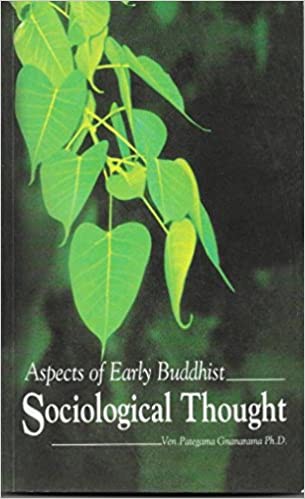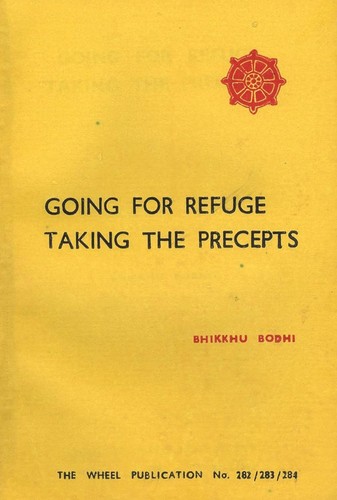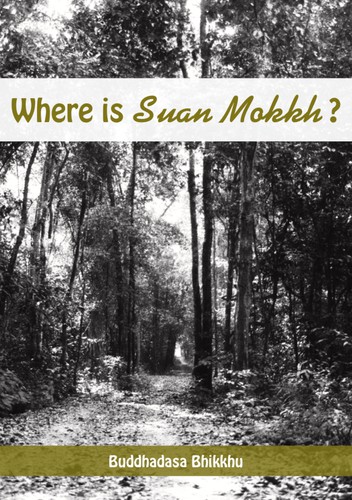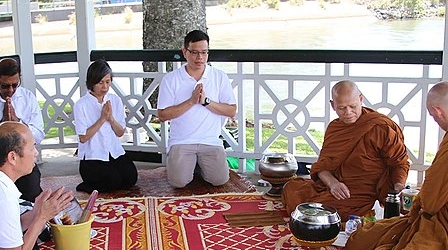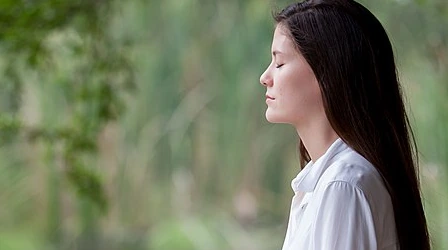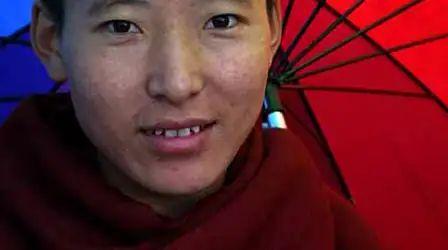Saṅgha
Subscribe to this topic via: RSS
Life and livelihood in the Buddhist community.
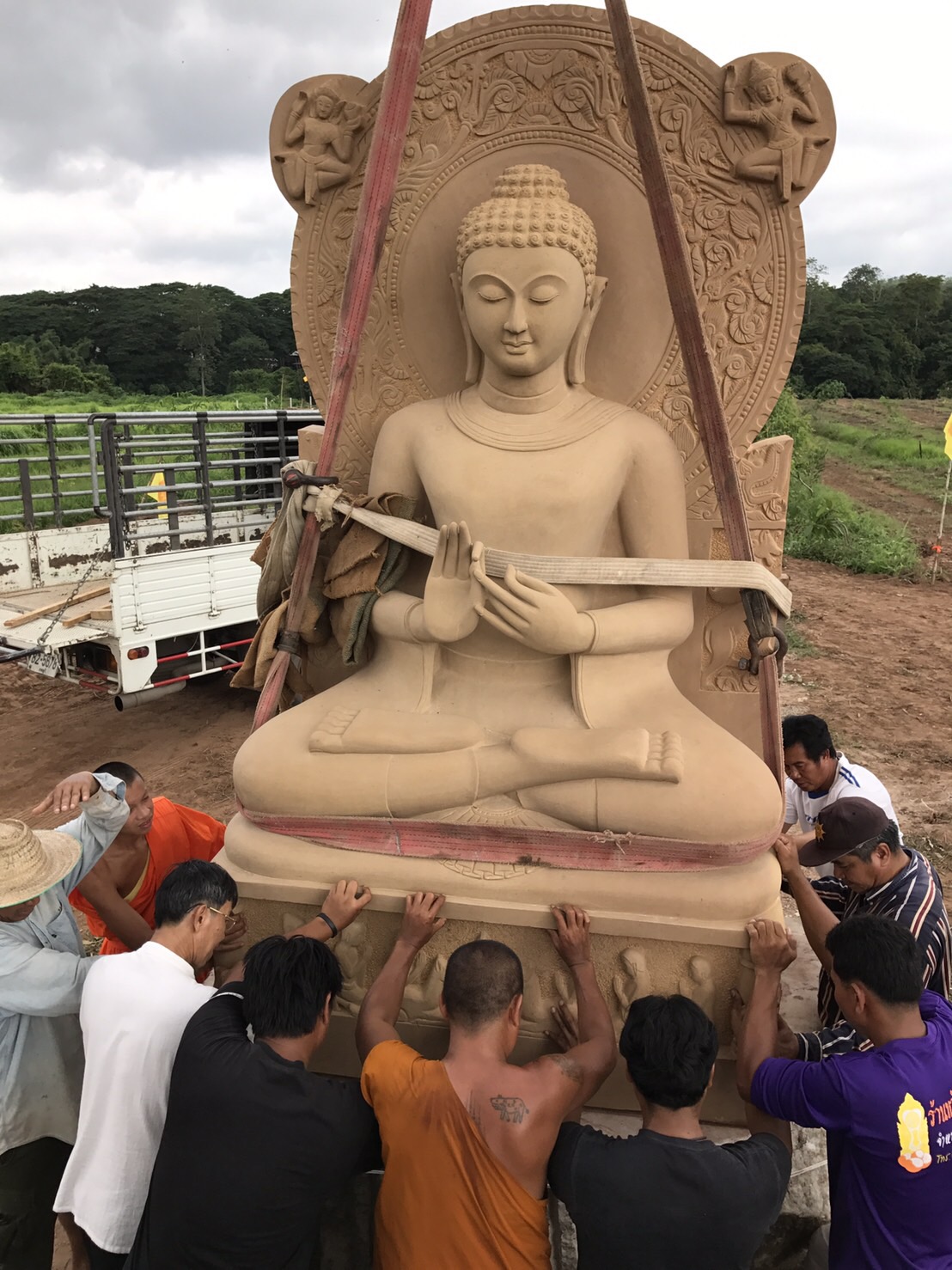
Two monks and seven laymen guide a large, sandstone Buddha image as it is lowered onto a pedestal outside a temple in Uttaradit, Thailand in 2017. (Photo by Devaprapat, CC BY-SA 4.0)
Table of Contents
Books (10)
Featured:
-
⭐ Recommended
See also:
Canonical Works (89)
Featured:
-
⭐ Recommended
A magisterial compendium of good advice for lay people.
-
⭐ Recommended
What kind of person does not torment himself, not being interested in self-torture, and does not torment others, not being interested in torturing others?
-
The Buddha gives a rough sketch of the entire path, and encourages us to remain skeptical until the very end.
-
The Buddha describes how a lay Buddhist should keep a sabbath day: by recollecting the triple gem together with the gods and by keeping the moral precepts beloved and kept by the noble ones.
-
⭐ Recommended
Judging by this fish’s approach, by the ripples it makes, and by its force, it’s a big fish, not a little one.
-
⭐ Recommended
It is painful to dwell without reverence and deference. Now what ascetic or brahmin can I honor, respect, and dwell in dependence on?
-
⭐ Recommended
What is so dear to you about contemplatives?
-
⭐ Recommended
Times that are unconducive to meditation practice, and those that are conducive.
-
⭐ Recommended
There are six proper occasions for going to see an esteemed mendicant…
-
⭐ Recommended
I recollect ninety eons back but I’m not aware of any family that’s been ruined merely by offering some cooked almsfood.
-
… there is no way a personal offering can be more fruitful than one bestowed on a Saṅgha
-
Is this venerable one restrained without fear, not restrained by fear, and does he avoid indulging in sensual pleasures because he is without lust through the destruction of lust?
-
Explains the three primary duties of a monk: guarding the senses, moderation in eating, and the devotion to wakefulness.
-
“It’s incredible, it’s amazing! Who can’t become a stream-enterer these days?”
-
There are ten warm-hearted qualities that make for fondness and respect, conducing to inclusion, harmony, and unity, without quarreling. What ten?
-
Bhikkhus, possessing three factors, a shopkeeper soon attains vast and abundant wealth…
-
There are, bhikkhus, these four qualities that make one an elder. What four?
-
… there are these five kinds of wealth. What five?
-
On a full-moon night, the Buddha was to recite the code of conduct for the monks. However, he remained silent until dawn, due to the presence of a corrupt monk. The Buddha follows this up with a memorable set of similes on the wonderful qualities of the Sangha.
-
… having fulfilled our duty, free of remorse and regret, we were reborn in a superior realm
-
Where dreadful serpents slither,
where the lightning flashes and the sky thunders
in the dark of the night;
there meditates a mendicant -
a knowledge master,
evolved, learned, and unflappable—
can help others to contemplate,
so long as they are prepared to listen carefully. -
Vaḍḍha, do not get caught
in the endless thicket of the world… -
⭐ Recommended
Mendicants, there are these five drawbacks of placing faith in an individual.
-
friends and colleagues, relatives and family should be encouraged, supported, and established in three things.
-
Mendicants, a resident mendicant with five qualities shows compassion to the lay people. What five?
-
Householders and homeless alike,
Each a support for the other -
I do not perceive another single factor so helpful as good friendship…
-
A faithful laywoman with a dear and beloved only son would rightly appeal to him: …
-
See how troubled are those with attachments…
-
Walking together, dwelling as one,
the knowledge master mixes with foolish folk. -
⭐ Recommended
Good, spiritual friendship is the whole of the holy life.
See also:
Readings (46)
Featured:
-
This paper reminds us that behind the abstract and academic discussions of monasticism there are real communities and relationships.
-
I allow you, monks, to turn the bowl upside down
-
As Buddhism came (comes) West, its followers have often been accused of following a “fad” or, worse, a cult. In this fascinating chapter, Ken Wilber provides a theoretical framework for distinguishing (or at least describing) the difference between “good” and “bad” forms of religious authority.
20 pages -
… there are at least three major orientations within Sinhalese religion: 1) Bodh Gaya, commemorating the enlightenment experience; 2) Kataragama, where access to transformative “this-worldly” sacral power is sought; and 3) Kandy, where religion legitimates a people’s cultural and political past and present through civil ceremony
-
To understand the vinaya correctly, we have to understand it in its historical context and as the product of a (continuing) historical process.
-
Why ordain when you can practice meditation as a lay person?
-
… the role of Buddhist temples in providing aid and taking care of survivors in the wake of the disaster, including the indispensable function of Buddhist monks to conduct funerals and other ceremonies, and their vital responsibility for helping the survivors overcome their suffering.
-
Participation in the program predicted increases in subjective well-being and mindfulness over time compared to the control group. Regardless of condition, frequency of meditation predicted lower psychological inflexibility and higher mindfulness, well-being, and progress toward values. Length of meditation session predicted a greater ability to observe experience, and prior meditation experience predicted greater nonreactivity to experience.
-
Although we have acknowledged the mutually beneficial nature of the archetypal relationships between teacher and meditator, it is certainly the case that this ideal is often not met.
-
Even if a house is of inferior quality, if decorated with flowers, it will appear to be a bower. It will become the source of a ‘clear mind’
-
The second day is similar to the first, except that you do not consume even the tiniest amount of food or drink
-
Our body is not life, but just a house. Life is energy. The coming together of mental, kammic and cosmic forces — that is life.
-
I have no problems with doing ‘Otsutome’ at the Hondo of our temple every morning and every evening. Chanting sutras to praise the virtue of Amida Buddha, and reciting the nembutsu to express gratitude for the process of interdependence at the end of Otsutome makes me feel great!
See also:
Audio/Video (24)
Featured:
-
⭐ Recommended
There’s always something we can do to progress towards Awakening. And it’s something that has benefits all along the way.
-

-
🥇 Best of
When we think about spiritual formation, I think it’s done best when it’s amplified through a community.
67 min -

-

-
Bhante Yuttadhammo talks about what it means to be a Buddhist, and how to think about “taking refuge”
-
This is the first important function of Sangha: it carries and conveys the many components of the Buddhist tradition that can’t be shared through writing.
-
A short series of iterviews about how to make American Jodo Shinshu temples more welcoming to LGBTQ+ people (and other minorities).
-

-
 4 min
4 min
See also:
